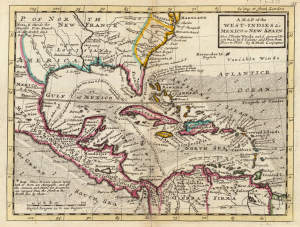The revolutions in France, in 1789, and in the US, in 1776, are widely regarded as the key revolutions of the modern world. They are presented as democratic revolutions organised around new understandings of equality and the redress of older forms of political and social hierarchy. Notwithstanding, the franchise was restricted to propertied white men and dispossession of indigenous people and the enslavement of them and Africans were central to both states.
There was, however, another revolution which took place around the same time and was more radical in both its intent and practice – this was the Haitian Revolution of 1804 – a revolution that is largely ignored.
 Saint-Domingue, as Haiti was known prior to the revolution, was a French colony in the western part of Hispaniola – an island in the Caribbean claimed by the Spanish. It was not only the most profitable colony within the French Empire – producing something like half of the world’s sugar and one third of its coffee – but it was also the largest export market for France. The commodities were grown on plantations worked by enslaved Africans who were brought there as a consequence of the European trade in human beings.
Saint-Domingue, as Haiti was known prior to the revolution, was a French colony in the western part of Hispaniola – an island in the Caribbean claimed by the Spanish. It was not only the most profitable colony within the French Empire – producing something like half of the world’s sugar and one third of its coffee – but it was also the largest export market for France. The commodities were grown on plantations worked by enslaved Africans who were brought there as a consequence of the European trade in human beings.
By the close of the eighteenth century, there was estimated to be over half a million enslaved African people living in Saint-Domingue together with a sizeable population of free and freed peoples of colour. During this period, there were a number of revolts in Saint-Domingue against the conditions of enslavement eventually culminating in the revolution of 1804 which abolished slavery and established a modern republic. It was the first to be based on the freedom of all its population.
The revolution in Saint-Domingue occurred around the same time as the American and French revolutions. Yet, it is rarely accorded a similar status, that is, of being a foundational event of world history. While there have been significant accounts of the Haitian revolution – most notably, perhaps, C. L. R. James’s (1989 [1963, 1938]) The Black Jacobins – few histories of the general ‘Age of Revolutions’ variety have included it as part of their understanding of that age. Even avowedly ‘global’ histories of the ‘birth of the modern world’, such as Christopher Bayly’s (2004) book of the same title or Jürgen Osterhammel’s (2014) Transformation of the World, devote considerably more attention to the standard historical narratives around the French and US revolutions, rather than address the Haitian revolution.
Bayly’s (2004) presentation of the Haitian Revolution barely amounts to a couple of sentences even though the cover of his book presents a striking portrait of Jean-Baptiste Belley. Belley was a Haitian revolutionary and, as a representative of Saint-Domingue, was part of the delegation that travelled to Paris to speak to the Constituent Assembly. A formerly enslaved person, Belley had bought his own liberty through labour in his own time, and argued persuasively and successfully (albeit, in retrospect, temporarily) for the abolition of slavery within the French empire (Dubois 2005: 169-70). It was only as a consequence of a delegation travelling from Haiti to France, that the clause abolishing slavery was included in the French Declaration of the Rights of Man and Citizen.
The most radical political statement of the French Revolution, that is, the one with the greatest universal potential, came from Haiti. Yet, this event is not included in most accounts of the birth of the modern world and, therefore, it leads to no reconsideration of the broader claims of European modernity that are otherwise being made. The dominant understandings of modernity that see it as formed in processes endogenous to Europe and abstracted from the entanglements of colonialism and Empire remain in place. Other events, to the extent that they are mentioned, simply add a descriptive embellishment to the standard narratives, but do not transform them.
To the extent that the Haitian revolution does get discussed, the debate often seems to pivot on the following question, as noted by Sala-Molins: ‘did Haiti make her revolution or did the French revolution spread to the colonies?’ (2006: 122). The inescapable conclusion of such a line of thought is that ‘[t]here was no Haitian Revolution: there was only a Saint-Domingue episode of the French Revolution’ (2006: 123). However, as Sala-Molins argues, if Haiti’s Black liberators are going to be made disciples of the Enlightenment, ‘then logic requires that things be clarified: these liberators subverted the language of the Enlightenment and gave it a meaning it did not have’ (2006: 124). It was also a meaning that would subsequently be rescinded by the supposed initiators of Enlightenment as Napoleon soon overturned the abolition of slavery and reintroduced it in the French colonies.
So, what else might we learn about the birth of the modern world and its transformation (and the politics of knowledge production, more generally) if we took the Haitian revolution seriously?
First, we would learn about the ways in which those who had been enslaved, on achieving their freedom and independence, honoured the  people who preceded them on the land. In renaming Saint-Domingue as Haiti they honoured the name given to the island by the Taino Arawak people who had been wiped out by Spanish and French colonization (see Geggus 2002: 207-220).
people who preceded them on the land. In renaming Saint-Domingue as Haiti they honoured the name given to the island by the Taino Arawak people who had been wiped out by Spanish and French colonization (see Geggus 2002: 207-220).
Second, we would learn that on achieving freedom and establishing the independence of Haiti, the working out of the Haitian constitution was predicated on an understanding of citizenship that had greater universal applicability than similar notions developed in the US and French Revolutions. Both the US and France, for example, maintained a racialized understanding of the political sphere in which only propertied white men were allowed to vote. In contrast, Haiti makes colour no bar to political participation.
Everybody who is Black can vote, the constitution declared. But Blackness was not defined epidermally, that is in terms of skin colour, but rather in terms of the political commitment of a population opposed to colonization. Those indentured German and Polish workers who had also been brought to Haiti by the French were regarded as Black, as were children born to white women on the island. As Fischer (2004: 266) argues, by making freedom from enslavement and racial discrimination the bedrock of political understandings and unlinking citizenship from race, the Haitian constitution radicalized and universalized the idea of equality.
Further, at the time that the revolutionary leaders were calling for the immediate, universal abolition of slavery, in the 1790s, there was no similar such call elsewhere in the Atlantic world. This is at a time when the US revolution maintained slavery as central to the constitution of its own society and France exerted imperial rule over its colonies which were similarly organized as slave societies. In light of this, it is no wonder that Trouillot (1995) suggests that the Haitian revolution was the most radical of its age and silenced, precisely, because of its radical nature.
The silencing happened almost immediately with France establishing a total economic blockade of the island. This blockade is not only a punitive act to punish Haiti for emancipating itself, but it seeks also to manage the ‘contagion’ of revolution and self-emancipation from spreading to other enslaved societies across the Caribbean and the Americas. The blockage bankrupted Haiti within twenty years and is only lifted in 1825 with the agreement by Haiti to pay France compensation for its loss of ‘property’. Compensation was paid, that is, for the loss of ‘property’ embodied in those human beings who had been enslaved and now had the temerity to emancipate themselves. They, however, were not, in turn, to be compensated for their enslavement and dispossession.
 Compensation was set at 150 million francs. To put this into context, at around the same time, France sold the entire territory of Louisiana to the fledgling United States for 80 million francs. Unable to pay the coerced indemnity ‘the Haitian government took loans from French banks, entering a cycle of debt that would last into the twentieth century’ (Dubois 2005: 304). This coerced debt was not repaid till the middle of the twentieth century by which time it is estimated that in today’s money, France had extracted from Haiti, the western half of the island of Hispaniola, the equivalent of $17 billion US dollars. It was an extraction that determined Haiti’s future poverty and was significant to the establishment of France’s prosperity.
Compensation was set at 150 million francs. To put this into context, at around the same time, France sold the entire territory of Louisiana to the fledgling United States for 80 million francs. Unable to pay the coerced indemnity ‘the Haitian government took loans from French banks, entering a cycle of debt that would last into the twentieth century’ (Dubois 2005: 304). This coerced debt was not repaid till the middle of the twentieth century by which time it is estimated that in today’s money, France had extracted from Haiti, the western half of the island of Hispaniola, the equivalent of $17 billion US dollars. It was an extraction that determined Haiti’s future poverty and was significant to the establishment of France’s prosperity.
The silences of history are many and the consequences of their perpetuation are stark. We can only work towards justice in the present by taking into account the historical processes responsible for the configuration of our shared worlds. Reparative histories are one aspect of the reparations more broadly needed.
[First published in Danish translation as ‘Et opgør med fortielsen af Den Haitianske Revolution’ Marronage Mar 31, 2017 pp36-41]
Bibliography and Further Reading
Bayly, Christopher A. 2004. The Birth of the Modern World. Oxford: Blackwell
Bhambra, Gurminder K. 2016. ‘Undoing the Epistemic Disavowal of the Haitian Revolution: A Contribution to Global Social Thought’ Journal of Intercultural Studies 37 (1): 1-16
Cooper, Anna Julia 1925. L’Attitude de la France à l’égard de l’esclavage pendant la Révolution. Paris: Impr. de la cour d’appel, L. Maretheux
Cooper, Anna Julia 2006. Slavery and the French and Haitian Revolutionists. Edited and translated by Frances Richardson Keller. Lanham: Rowman Littlefield.
Dubois, Laurent 2004. A Colony of Citizens: Revolution & Slave Emancipation in the French Caribbean, 1787–1804. Chapel Hill: University of North Carolina Press
Dubois, Laurent 2005. Avengers of the New World: The Story of the Haitian Revolution. Cambridge: Harvard University Press
Fischer, Sibylle 2004. Modernity Disavowed: Haiti and the Cultures of Slavery in the Age of Revolution. Durham: Duke University Press
Geggus, David P. (ed.) 2001. The Impact of the Haitian Revolution in the Atlantic World. Columbia: University of South Carolina Press
Geggus, David P. 2002. Haitian Revolutionary Studies. Bloomington: Indiana University Press
Jackson, Maurice 2008. ‘“Friends of the Negro! Fly with me, The path is open to the sea”: Remembering the Haitian Revolution in the History, Music, and Culture of the African American People,’ Early American Studies: An Interdisciplinary Journal, 6 (1): 59-103
Jackson, Maurice and Jacqueline Bacon (eds) 2010. African Americans and the Haitian Revolution: Selected Essays and Historical Documents. New York: Routledge
James, C. L. R. 1989 [1963, 1938]. The Black Jacobins: Toussaint L’Ouverture and the San Domingo Revolution. Second Edition. New York: Vintage Books
May, Vivian M. 2008. ‘“It is Never a Question of the Slaves”: Anna Julia Cooper’s Challenge to History’s Silences in Her 1925 Sorbonne Thesis,’ Callaloo 31 (3): 903–918.
Osterhammel, Jürgen 2014. The Transformation of the World: A Global History of the Nineteenth Century. Translated by Patrick Camiller. Princeton: Princeton University Press
Sala-Molins, Louis 2006. Dark Side of the Light: Slavery and the French Enlightenment. Translated and with an Introduction by John Conteh-Morgan. Minneapolis: University of Minnesota Press
Shilliam, Robbie 2017. ‘Race and Revolution at Bwa Kayiman,’ Millennium: Journal of International Studies TBA
Trouillot, Michel-Rolph 1995. Silencing the Past: Power and the Production of History. Boston: Beacon Press
2 thoughts on “Undoing the Silencing of the Haitian Revolution”